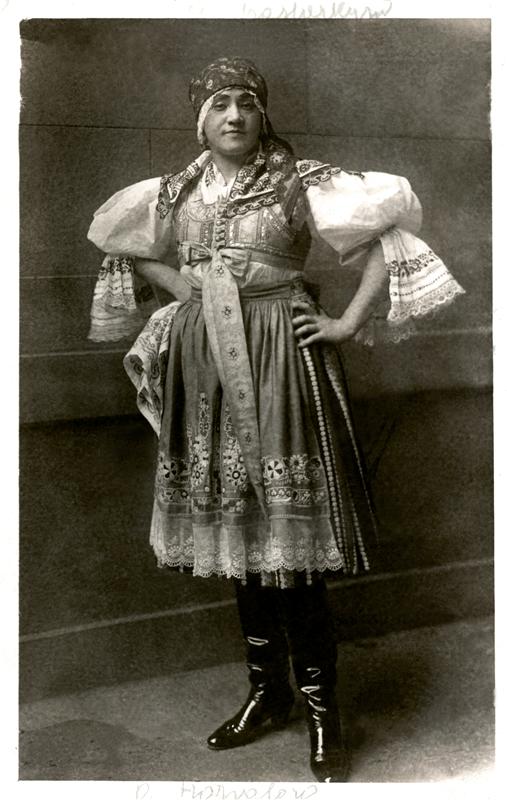
Gabriela Horvátová, Praga Její pastorkyňa 1916, credit Wikipedia
Welsh National Opera’s Jenůfa
Wales Millennium Centre, Cardiff, Saturday 5th March 2022, reviewed by David Truslove
Secrets, shame and small communities make for an inflammatory cocktail. In this latest revival by Eloise Lally of Katie Mitchell’s 1998 Jenůfa, the tensions within Leoš Janáček’s first opera were given powerful expression through strong, well-defined performances and a staging that artfully mirrors the moral constraints of village life. Turbulent emotions were underpinned with gripping intensity by the WNO orchestra under its director Tomáš Hanus who, in a pre-performance speech referencing the tragedy unfolding in the Ukraine, reminded us of the work’s fundamental humanity.
At the heart of this psychological drama is Jenůfa’s corrosive shame set in motion by her pregnancy at the hands of the feckless Števa. He rejects his bride-to-be after his resentful half-brother Laca disfigures her in a crazed knife attack. Determined to hide the truth from a local community with rigid mores, her stepmother, the fatally proud Kostelnička, murders the child in the belief that her maternal love is protecting Jenufa from pious condemnation. Only towards the end does the Kostelnička confess she loved herself more than her stepdaughter. But from lives irrevocably blighted, physically and emotionally, hope is born through the redemptive power of love, its message transfigured in Jenůfa’s acts of forgiveness accompanied by uplifting music proclaiming the greatness of her soul.
While this production takes time to find its feet, Vicky Mortimer’s claustrophobic interiors underline the confining attitudes of this tight-knit Moravian community. In the third act, when the villagers gather in front of the table in preparation for the wedding ceremony of Jenůfa and Laca, the scene, intentionally or not, evokes Christ’s last supper, its impending sacrifice implicit. If the child’s murder is a sacrificial act, then its brutality is redeemed by its mother’s humanity. A brief garden scene in which a child greets Jenůfa’s stepmother occupies an optimistic epilogue.
Making her debut in the title role soprano, Elizabeth Llewellyn traverses wilful passion to numbed grief, finally emerging with dignity and heart-warming compassion. Vocally poised, if somewhat taut, her phrases glow with conviction despite some unclear diction. Her prayer to the Virgin Mary after discovering her missing baby was intensely moving. More at ease with the original Czech was Eliška Weissová, a graduate of the Conservatory in Brno where Jenufa was originally staged in 1904 at the National Theatre. She made for a fanatical Kostelnička, an authoritarian presence yet not lacking in pity when she strokes Jenůfa’s hair after announcing her baby’s sudden death. Weissová drew on a rich vocal palette making Kostelnička’s complex emotions all the more credible. Of all Janacek’s characters, hers is the most rounded and it is no surprise that Gabriela Preissová’s play, on which the libretto is based, was called Her Stepdaughter.
Amongst the other performers, Peter Berger drew our sympathy as Laca, belligerence yielding to benevolence in both character and voice, while Rhodri Prys Jones made for a spirited if disagreeable Števa. Sian Meinir as the Grandmother, Aaron O’Hare the Mill foreman and Sion Goronwy the Mayor provided solid support. The WNO chorus acquitted themselves with aplomb and the orchestra, under Tomáš Hanus, brought out the febrile energy and gritty lyricism of Janáček’s score with wonderful refinement.
David Truslove
Continues at Cardiff on 12th & 18th March and then on tour until 10th May










